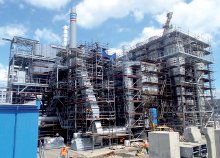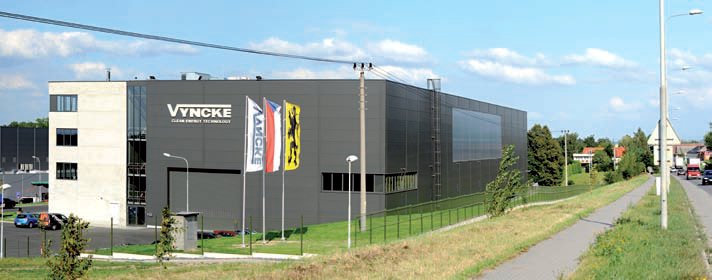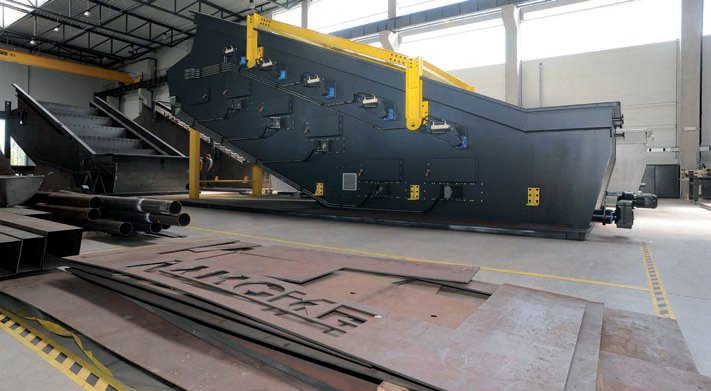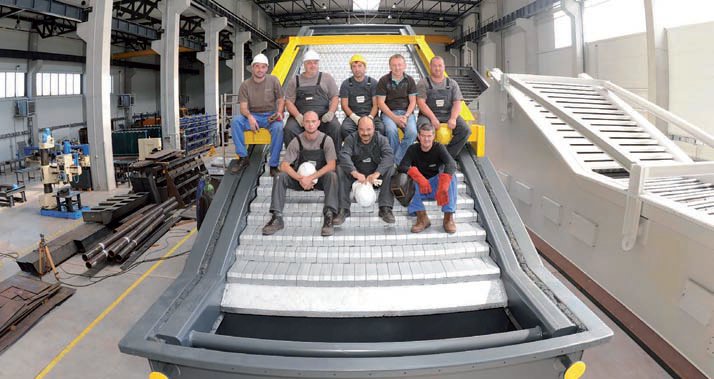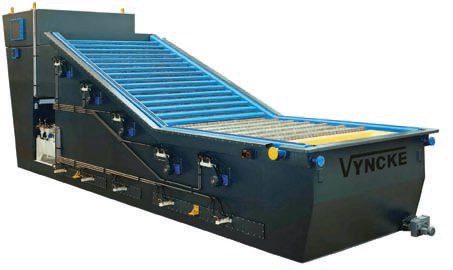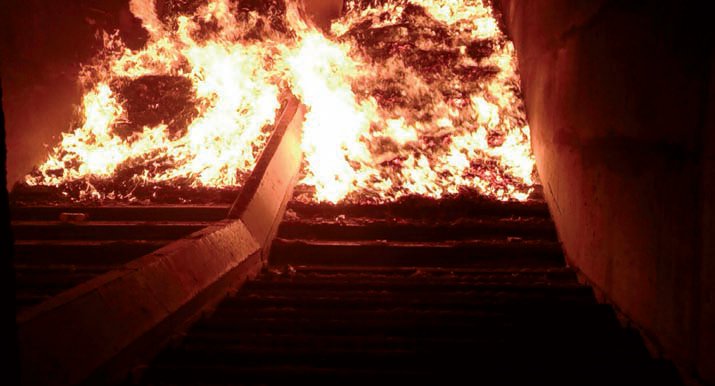Supplying process energy to the world
17 September 2014Headquartered in Harelbeke in Flanders, Vyncke NV is a family-owned company which, from small beginnings 102 years ago, has grown into a truly global business. Mike Botting visited its new factory in the Czech Republic.
In 1912, Louis Vyncke, a blacksmith, founded a business repairing boilers for the steam age. Now the fourth generation of the Vyncke family, Peter (43) and Dieter (36) Vyncke, are the ceo and coo, respectively, and have managed the business since 2002.
The brothers took over the management from their father Dirk, following a tradition established since Michel took over from his father Louis in 1940 and Dirk from his father Michel in 1972.
Peter and Dieter have nine children between them, so it seems likely that the fifth generation will be running the family firm at some point in the future.
All 310 employees of the Vyncke company worldwide are known as Vynckeneers and are encouraged to feel they are part of the wider Vyncke family.
Louis moved from refurbishing boilers to making coal-fired ones and then, being in a major flax-growing region, to making boilers fired by the waste from the flax-based textile industry. Thus, unknowingly at the time, began Vyncke's long association with the biomass-to-energy concept that we think of as 'state-of-the-art' today.
The 1972 Middle East fuel crisis gave Vyncke another push towards biomass, as fossil fuels for boilers became expensive and difficult to obtain. Wood residues from furniture factories (previously dumped) thus became a major source of fuel for Dirk Vyncke's company's boilers, with the energy produced being used to heat the factories.
Louis Vyncke also began the company's long track record of exporting its products, by selling boilers to what, at the time, was the Belgian Congo. They began their journey from the factory by being sealed and floated down the adjacent river!
In the 1950s and 60s, a particleboard manufacturing industry grew up in Flanders, based on flax as a raw material (sometimes mixed with wood). Companies such as Unilin, Linopan, Interlin and others used this local resource and thus began Vyncke's long involvement with the panel industry, including supplying the energy system to Belgian wood panel manufacturer Agglo (now Norbord) in the early 1990s.
In 1978, Dirk Vyncke sold the first boiler to Singapore, to a sawmill - of which there were several at the time - and opened the company's first overseas office there. As the sawmills on the island closed and moved to other South East Asian countries, Vyncke's exports moved with them.
Then, in the 1970s and 80s, palm oil residues and rice husks provided another biomass fuel for hot water and steam boilers which the company supplied to Africa, Asia and Latin America.
In the mid-90s, Vyncke became very active in the panel industry in S E Asia, which was moving over to rubberwood as the raw material of choice, and more than 70% of boilers in that industry were supplied by the Belgian company, which put engineers on the ground in Kuala Lumpur and, later, in Bangkok. Up to this time, most of Vyncke's business had been in Europe but this was the beginning of its global expansion.
"In the early 2000s, there was a wave of expansion in the panel industry in China and we jumped on that wave," said Jef Mestdagh, chief marketing officer, based in Harelbeke.
"Our first joint venture [jv] was set up in Pune in India in 2007. Known as Forbes Vyncke, it has sold more than 50 biomass energy plants to India and the surrounding countries, for a wide variety of industries. In 2013, we built a new workshop there."
Vyncke China Ltd was established in Suzhou, China, in 2007 with an office and workshop. In 2012, the Chinese factory fully engineered and supplied its first energy system, to Vanachai in Suraburi, Thailand and this was chosen outside a turnkey package for the rest of the plant.
Again in Thailand, a company called Getabec makes boilers under Vyncke licence and Vyncke also runs an office there employing four Vynckeneers.
Vyncke Sdn Bhd in Kuala Lumpur was established 20 years ago and employs 25 sales people, project managers and field engineers and was the first overseas posting for Peter Vyncke, from 1995 to 1999.
Back in the home country, Callens Vyncke was established as another jv in 2009, making gas-fired co-generation systems, mainly for the European market.
There are three facilities for engineering and manufacturing (in Flanders, China and Czech republic) and four regional offices (Brazil, Malaysia, Thailand and Germany) to provide rapid service to customers.
Vyncke also has a 40% share in Xant of Flanders, which makes small wind turbines that can be transported in a 40ft container and easily erected on site. The target market is industrial plants in remote areas of the world. So, this is another diversification in the energy business for the company.
Around 30-40% of Vyncke's business is in the wood market, mostly panels, and another 40% or so is in the agricultural and food industries, while community heating systems, with boilers fired by a variety of biomass materials, is another growing market.
Although the business was born in Flanders, the manufacturing base at Harelbeke is now the smallest of the company's global production units for its energy generation technologies, but of course it still remains the 'foundation stone' of the Vyncke company.
A major step in the globalisation strategy for manufacturing came when the company rented a workshop near Ostrava in the Czech Republic.
"Vyncke first set up a sales office in Prague in 1992 because there were a lot of small woodworking companies needing boilers," said Petr Salvet, regional manager for central and eastern Europe. "We sold about 30 boilers in the 1990s in the Czech Republic and Slovakia and we realised that we needed a production facility for combustion systems and boilers above 10MW here, so in 2000 we rented a factory building and in 2001 started to produce boilers. One of our first big projects was a 40MW steam boiler for Chile.
"In 2004 we decided to establish an engineering office here and took on four engineers, designing components for the Belgian factory."
In 2007, full engineering of whole energy plants was commenced by Vyncke SRO in Frýdek-Místek, near Ostrova, with the first such plant being supplied to the Duratex ll line in Brazil.
"By this time we had a full engineering office here, employing 25 people, and in 2007/8 we built a 90MW multi-media energy plant for an MDF plant in Germany," said Mr Salvet.
The business in the Czech Republic was now so well-established that Vyncke decided to build a completely new factory, not far from the rented workshops, in Chlebovice, a suburb of Frýdek-Mistek, which is about 30 minutes' drive from Ostrava.
"In July 2012 we moved into the new factory and in September we celebrated 100 years of Vyncke; and 20 years of Vyncke SRO in the Czech Republic," said Mr Salvet. The factory employs more than 100 Vynckeneers.
However, that is not the end of the development in Chlebovice by any means. Preparations are currently under way to add, by the end of this year, an 800m2 extension to the production area of the factory at one end for finishing; and a floor onto the top of the offices to give more office space and a dining and recreation area for the staff. This was all planned and facilitated when the existing factory was built.
Further down the line, time-wise, another complete production building will be constructed adjacent to the existing building and this will increase production space from 3,200 to 5,400m2. The land was being levelled at the time of WBPI's visit in early June, although a date for construction had not yet been decided. With seven boiler projects under construction at that time, the need for extra space was all too apparent.
The Chlebovice factory is the most important manufacturing facility in the Vyncke group in terms of plants produced, while the company's factory in Suzhou, China, is second, leaving Harelbeke in third place these days.
The Vyncke system
Manufacturing is at the heart of the Vyncke business, as is very clear when you notice that all offices in Chlebovice literally have a window onto the production floor, so nobody has an excuse to forget that fact.
"We have our own core technology for the combustion process and that part is always made in our own workshops, while simpler steelwork may be contracted out to save on transport costs to overseas projects," explained Mr Salvet. "But the step grates at the heart of the combustion system are always made inhouse."
One reason for the location of the factory is that Ostrava has a history of heavy engineering and has companies well able to supply steel sub-assemblies. Neighbouring Slovakia and Poland also have a lot to offer in that regard.
"Fuel flexibility in an energy plant is also very important and the ability to use more than one type of fuel, with a variety of moisture contents, in our systems, is a great advantage," continued Mr Salvet. "Another consideration is that emissions regulations are becoming more and more stringent, especially in Europe, and controlling emissions is part of our competence.
"The energy generation system is vital to the production of a panel production line and reliability is key to all Vyncke's systems. Mechanical driving systems, combustion systems, cooling systems, etc are all important in this."
Water cooling of the step grates results in the avoidance of the build-up of ash and clinker in the furnace, caused, for instance, by foreign materials like melamine, which melts at low temperatures. That can be a costly problem to fix, so Vyncke offers its Dynamic Water cooled Stepgrate, or DWS, particularly where fuel with high calorific values is concerned, to avoid such issues.
Compared to the continuous press, the energy system may be considered a relatively small investment but if that system stops for any reason, it is clear that all panel production will also stop.
"Vyncke energy systems are developed to have the highest availability of all key components in a panel production plant," said Mr Salvet. "Subject to once-yearly maintenance stops, our energy plants provide energy on a non-stop basis throughout the year."
The heaviest grate Vyncke SRO has made to date was for Sonae's MDF mill in Portugal and consisted of two units, each weighing 65 tonnes.
Making the best use of the heat generated, the hot water produced by cooling the grates is used for pre-heating of the combustion air.
The most recent major project for a panel manufacturer in the EU was completed in September 2013 for IKEA's (formerly Swedspan) particleboard line in Malacky, Slovakia.
This double step-grate installation has a 42MW capacity for hot gas for the dryer, a 15MW thermal oil heater and a 10MW hot water capacity for building heating and so on. It can also produce steam. The plant has a total capacity of 49MW.
The panel industry
"We have extensive experience in the wood based panel industry and are totally focused on energy plants and on the use of a range of different fuel types for energy generation," said Stefaan Lauwers, chief technology officer at Vyncke (who used to work for panel maker Unilin).
"There is a tendency among panel manufacturers now to move from turnkey solutions [for the whole panel production plant] towards sourcing the components of the line individually, he said. "For instance, that IKEA line was ordered directly from Vyncke, rather than as part of the overall press line package. We at Vyncke are very experienced in integrating our equipment with that of other suppliers.
"Some bigger-capacity panel plants don't have enough fuel available on site so they have to source other fuel, which may be very different [in its characteristics] and we have the experience to deal with every type of fuel.
"For instance, we are supplying the energy plant to the "White OSB" factory in Alor Setar in northern peninsular Malaysia (the first such line in the region) and that will use rice husk as well as wood residues for fuel.
"Globally, demolition wood, a heavily contaminated and dry fuel, is also used by some big panel plants and requires specific knowledge in combustion engineering to keep emissions under control.
"There are three main parameters to consider with fuel supplies: moisture content; ash fusion temperature, with low fusion temperature leading to clinker formation; and granulometry [coarse or fine material]," said Mr Lauwers. "How to burn it will depend on these factors and we offer different types of step grate: air-cooled; semi-water cooled; and hybrid with a water-cooled and semi-watercooled grate.
"The hybrid grate is good for the panel industry as they have a variety of fuel sources.
"The design of the whole combustion process is key - the grate, the furnace, the air supply, fuel feed, cooling and emissions control." Mr Lauwers explained that many panel factories are generating steam from thermal oil (indirect steam) for refiners, etc, but that Vyncke offers direct steam generation, plus thermal oil heating, plus hot gas for the dryer, if required.
"For wood fibre insulation board, you only need hot gas and steam for the manufacturing process and we can do that as well," said Mr Lauwers.
South America has produced four orders already this year, from Berneck, Guararapes, Duraplay and Masisa.
VRG Quangtri in Vietnam, DongWha in Merbok, Malaysia and two 'mystery clients' for Dieffenbacher MDF lines - one in 'West Asia' and one in Pakistan - have also ordered systems from Vyncke.
During the more than 100 years of its existence, Vyncke has continually adapted to a changing market, following the example set by its founder, Louis, in the early years. It is involved in many market sectors where biomass expertise is required.
Different fuel types, environmental regulations and energy requirements, have all periodically caused the company to reinvent what it offers to keep ahead of the game.
Vyncke generation five will no doubt have more challenges to face in continuing to keep this long-established family company relevant in an ever-changing marketplace.
